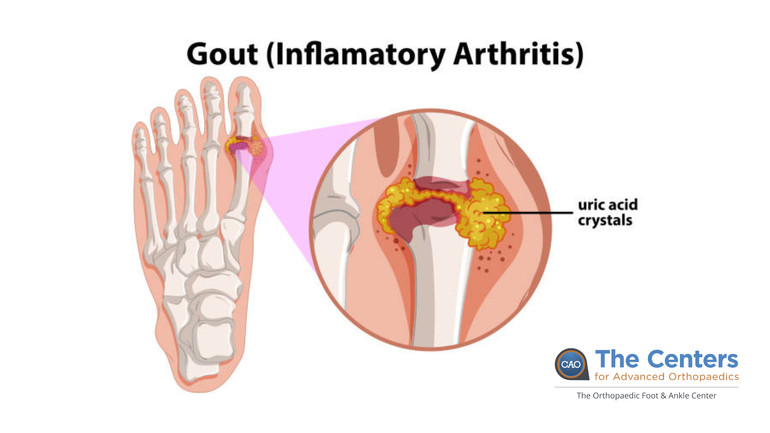The Centers for Advanced Orthopaedics is redefining the way musculoskeletal care is delivered across the region with locations throughout Maryland, DC, Virginia and Pennsylvania.
What is Gout? Symptoms, Causes, and Dietary Restrictions

What is Gout?
Gout is a disorder that results from the build-up of uric acid in the tissues or a joint—most often the joint of the big toe. An attack of gout can be miserable, marked by the following symptoms:
- Intense pain that comes on suddenly—often in the middle of the night or upon arising.
- Redness, swelling, and warmth over the joint—all of which are signs of inflammation.
What Causes Gout?
Gout attacks are caused by deposits of crystallized uric acid in the joint. Uric acid is present in the blood and eliminated in the urine, but in people who have gout, uric acid accumulates and crystallizes in the joints. Uric acid is the result of the breakdown of purines, chemicals that are found naturally in our bodies and in food. Some people develop gout because their kidneys have difficulty eliminating normal amounts of uric acid, while others produce too much uric acid.
Gout occurs most commonly in the big toe because uric acid is sensitive to temperature changes. At cooler temperatures, uric acid turns into crystals. Since the toe is the part of the body that is furthest from the heart, it’s also the coolest part of the body – and, thus, the most likely target of gout. However, gout can affect any joint on the body.
The tendency to accumulate uric acid is often inherited. Other factors that put a person at risk for developing gout include: high blood pressure, diabetes, obesity, surgery, chemotherapy, stress, and certain medications and vitamins. For example, the body’s ability to remove uric acid can be negatively affected by taking aspirin, some diuretic medications (“water pill”), and the vitamin niacin (also called nicotinic acid). While gout is more common in men aged 40 to 60 years, it can occur in younger men and also occurs in women.
Consuming foods and beverages that contain high levels of purines can trigger an attack of gout. Some foods contain more purines than others and have been associated with an increase of uric acid, which leads to gout. You may be able to reduce your chances of getting a gout attack by limiting or avoiding the following foods and beverages: shellfish, organ meats (kidney, liver, etc.), red wine, beer and red meat.
Diagnosis
In diagnosing gout your foot and ankle specialist will take your personal and family history and examine the affected joint. Laboratory tests and x-rays are sometimes ordered to determine if the inflammation is caused by something other than gout.
Treatment
Initial treatment of an attack of gout typically includes the following:
- Medications: Prescription medications or injections are used to treat the pain, swelling and inflammation.
- Dietary restrictions: Foods and beverages that are high in purines should be avoided, since purines are converted in the body to uric acid.
- Fluids: Drink plenty of water and other fluids each day, while also avoiding alcoholic beverages, which cause dehydration.
- Immobilize and elevate the foot: Avoid standing and walking to give your foot a rest. Also, elevate your foot (level with or slightly above the heart) to help reduce the swelling.
- Cortisone injection: A combination of numbing medicine and cortisone injected into the joint can help relieve pain and reduce the inflammation.
The symptoms of gout and the inflammatory process usually resolve in three to ten days with treatment. If gout symptoms continue despite the initial treatment, or if repeated attacks occur, see your primary care physician for maintenance treatment that may involve daily medication. In cases of repeated episodes, the underlying problem must be addressed, as the build-up of uric acid over time can cause arthritic damage to the joint.
When is Surgery Needed?
Surgery is rarely needed, but in some cases of chronic gout, surgery is required to remove the uric acid crystals and repair the joint. Your foot and ankle specialist will determine the procedure that would be most beneficial in your case.
What Should You Eat?
Dietary restrictions suggest what people should not eat, but what should people eat? What foods will help control gout attacks? The American Medical Association recommends the following dietary guidelines for people with gout, advising them to eat a diet:
- high in complex carbohydrates (fiber-rich whole grains, fruits and vegetables)
- low in protein (15% of calories and sources should be soy, lean meats or poultry)
- no more than 30 % of calories in fat (with only 10% animal fats)
Recommended Foods to Eat
- Fresh cherries, strawberries, blueberries and other red-blue berries
- Bananas
- Celery
Managing gout is crucial for maintaining your mobility and quality of life. At The Orthopaedic Foot & Ankle Center, our foot and ankle physicians are committed to offering comprehensive care for those suffering from gout. Call to schedule your appointment now or book online.